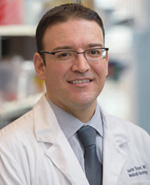Interview With 2017 ASH-AMFDP Award Recipient Justin Taylor, MD

Justin Taylor, MD, is a 2017 ASH-AMFDP Award recipient. He is a medical oncologist at Memorial Sloan Kettering Cancer Center in New York, New York.
How does your current research focus tie into your professional goals?
I am a medical oncologist who treats patients with leukemia and other blood disorders. My current research investigates the role of a mutation that occurs in certain types of leukemia and how it might lead to initiation or promotion of those leukemias. The ultimate goal of my research is to understand these mutations better in order to develop new treatments that are sorely needed for some patients affected by these diseases.
What intrigues you most about hematology-oncology? Who or what encouraged you to pursue this subspecialty of medicine?
I am intrigued by how complex cancers are and how they can continue to adapt to the disruptive environment they create within a cell or tissue or under the selective pressure of the drugs we use to treat them. Even blood cancers that are relatively less complex than solid tumors still present significant challenges. I became interested in oncology early on when I was an undergraduate and participated in a research program for underrepresented minorities led by Dr. Rob Hromas while he was chief of hematology-oncology at the University of New Mexico Cancer Center.
What role does diversity play in your practice? How does your own background help inform your decisions when it comes to patient care?
I have always believed that having a diverse workforce in health care will lead to better care of all patients. I believe my own background helps me to connect better with patients to try to understand where they are coming from and what other issues they might be dealing with.
How important have mentors been to you throughout your medical journey? What advice would you give to an individual who is looking for the right mentor?
I would not be where I am today if it weren’t for all the great mentors I had every step of the way. Many of my mentors have helped me find opportunities I wouldn’t have known existed otherwise. I would advise others to look for a mentor who is going to be able to invest time in your career development. A mentor who is very senior may have leadership and other responsibilities that could make them too busy to spend a lot of time with you. On the other hand, a very junior mentor might be too busy trying to build their own career and likewise not have much time for you. Look for a mentor who can meet frequently and seems committed to helping advance your career.
What would you like to contribute to the field? How will your participation as an ASH-AMFDP Award recipient help you reach your specific goals?
My first and foremost goal has always been to help patients with cancer, and I think I can make the biggest impact by performing translational research that will bring science to the bedside. I would like my contribution to be advancing the field of precision medicine by bringing individualized treatments to patients based on the genetic or epigenetic characteristics of their cancer. The ASH-AMFDP Award will help immensely as it is my first significant career development award and spans a four-year period. During this time, I will develop my independent research program and lay the foundation for future scientific inquiry into the molecular mechanisms of leukemia.